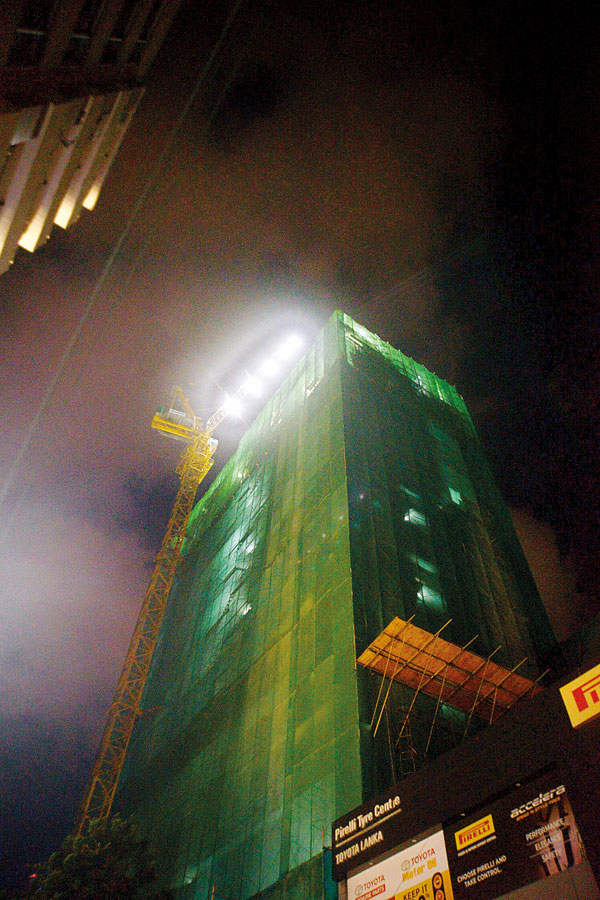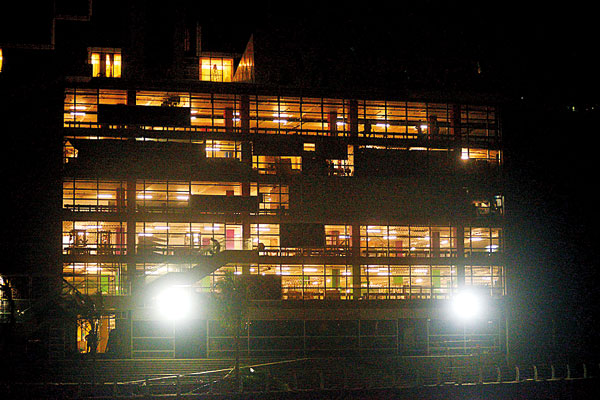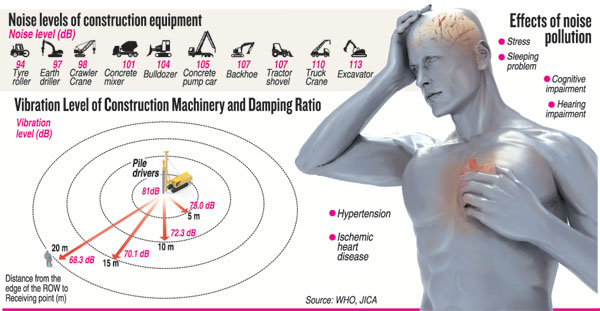News
Heavy doses of jarring building work nuisance endangers mental health
View(s):
Constructions being carried out at night. Pix by Eshan Fernando
By Nadia Fazulhaq
From jolting, earth-shaking pile-driving to the constant noise of concrete mixers and industrial machinery, night shifts at Colombo’s construction sites are making residents spend stressful, restless, and sleepless nights.
Prolonged exposure can cause hearing loss, or tinnitus, or both. Hearing loss can also be caused by a single loud noise.
Depending on the types, pile-driving can generate upwards of 132 decibels of noise, equal to the sound of an aircraft taking off. Such a level is considered dangerous and painful. Decibels measure the loudness of sound.
The noise level for an indoor air-conditioner is between 20 and 40 decibels (dB) while pile driving in a construction site can be 120dB or more, a concrete mixer emits noise of about 80 dB, a crawler crane about 98 dB, and an excavator, bulldozer, and loader 112 dB.
The maximum permissible noise for construction work under the National Environmental Act is 75 dB during day time and 50 dB at night.
Central Environmental Authority (CEA) Chairman Supun Pathirage told the Sunday Times that though noise-generating construction work is not allowed after 10 p.m. approval has been given for certain large-scale projects that have to work day and night to complete their work.
“However, we have informed them to avoid loud construction work at night time and to fix noise barriers if the site is in a mixed residential-commercial property,” he said, adding that the CEA will act on complaints of night-time noise.
“The environment clearance is given on the basis that there will not be a disturbance to the surrounding neighbourhoods, especially at night. There have been instances when the CEA has issued warnings and instructed them to put noise barriers. Once a complaint is lodged, we will frequently visit the site as well as the neighbourhood to ensure [noise] pollution doesn’t continue,” he said.
Colombo Municipal Council commissioner Bhadrani Jayawardena said construction companies operating in the city have been told to stop work at 10 p.m.
“Action can be taken under the Nuisance Ordinance if the noise continues throughout the night causing inconvenience to residents. The public can also dial 119 and report to the police,” Ms Jayawardena said.
M.D. Paul of the National Construction Association of Sri Lanka (NCASL) said many builders are now accelerating work after a long delay due to the economic crisis. “They are in a rush and may not be bothered about the public nuisance factor.’’
Urban Development Authority (UDA) Chairman Nimesh Herath said large-scale construction work should halt by 6 p.m. while only minor internal work can continue up to 10 p.m.
“The UDA issues development permits subject to noise guidelines issued by the CEA. The UDA informs the developer to restrict to the given time limit and condition on noise pollution control in the development permit,” he said.

He said construction work such as laying concrete slabs can continue throughout the night with the permission of the police, however, the task should be completed in a limited time.
Consultant psychiatrist and former director of the Institute of Mental Health Dr. Jayan Mendis said noise from construction sites at night time can have a psychological impact on residents who are deprived of sleep.
“Residents in the neighbouring areas may have sleep problems, increased stress levels, fatigue due to lack of sleep, cardiovascular issues due to blood pressure levels increase, anxiety, and depression,” said Dr. Mendis.
He said children in the vicinity will suffer from cognitive impairment, while the elderly will also experience negative effects of mental health.


| Smartphone apps to help measure noise Sri Lankans troubled by loud noise can barely make a legally sound complaint to the police or noise- pollution regulators unless they have a tool that objectively measures the danger to their health and provides a readout. Mobile phone users can choose and download from several apps available online. One of them is ‘Sound Meter Pro’ for Android phones. The ‘NIOSH Sound Level Meter’ developed by The National Institute for Occupational Safety and Health of the United States allows the user to save the measurements. It is free on the App Store. Prolonged, unprotected exposure to 100 decibels for 8 hours a day can cause permanent hearing loss. NIOSH advises a recommended exposure limit of 85 decibels. There is also ‘Sound Meter’ on iTunes and Google Play. | |
| Don’t hesitate to complainPolice Environment Protection Division Director, Manoj Perera urged people to lodge complaints at the nearest police station or the Police Environment Protection Division if noises from construction sites caused disturbances, especially at night.“With noise regulations and laws on public nuisance in place, we are able to warn and even take action against developers,” the SP said. |
The best way to say that you found the home of your dreams is by finding it on Hitad.lk. We have listings for apartments for sale or rent in Sri Lanka, no matter what locale you're looking for! Whether you live in Colombo, Galle, Kandy, Matara, Jaffna and more - we've got them all!

